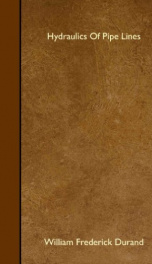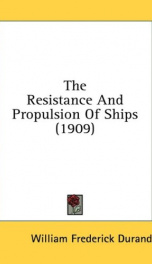hydraulics of pipe lines

HYDRAULICS - 1921 - PREFACE - THIS book is intended to give, in a reasonably adequate engineering form, a discussion of the more important hydraulic problems which arise in connection with pipe lines and pipe line flow. No attempt has been made to cover the subject from the structural or descriptive viewpoints. In Chapter V the treatment is partly structural and descriptive, but rather as incidental to the main purpose of the work. Chapter I presents briefly the elementary principles relating to pipe Line flow with some special emphasis on the subjects of pipe friction and secondary losses due to miscellaneous turbulence. Special attention may also, perhaps, be directed to the series of relations and expressions in Section 11 and to the treatment of network systems in Section 21. Chapter I1 presents the subject of surge, not with analytical detail but in such manner as to place before the engineer a variety of means for dealing with this important problem. Attention may be directed to the special application of the principles of similitude as applied to this problem, thus bringing it within the range of laboratory investigation. In Chapter I11 is given a reasonably full analytical treatment of the subject of water ram or shock. This seems to be justified by the absence, so far as the author is aware, of any measurably adequate discussion of this subject in the English language. The method employed starts with the fundamental principles as first developed by Joukovsky. The details of the development are however, largely independent of other sources. Special attention may be called to the discussion of other proposed formula for shock, showing the necessary limitations which must surround their use, and in particular to that of Allievi which has been so commonly employed without a proper appreciation of its necessary limitations. Attention may also be called to the extension of this method to include the hypothesis of partial or imperfect reflection at the valve-and of the need of experimental work to serve as a basis for determining what degree of reflection may be expected under various operating conditions. Chapter IV presents, with some new material, the general subject of stresses in pipe lines, due either to static pressure or under conditions of flow. Chapter V presents some descriptive and structural material, especially with reference to materials, joints, fastenings, fittings, etc. It gives likewise some discussion of the problem of economic design and of a number of special problems connected with the installation and equipment of pipe lines. Chapter V1 presents a brief discussion of oil pipe lines, or more broadly of any pipe line intended especially for the carriage of viscous fluids. Particular attention may be directed to the method of treatment involving the use of the general equation of flow as discussed briefly in Appendix I. There seems good reason to believe that if the frictional resistance is thus determined, as a function of diameter, velocity, density and viscosity, with a proper allowance for the physical condition of the flow surface of the pipe, the results will be entirely reliable and the design of such pipe lines may be undertaken with the same degree of confidence as in the case of those for the flow of water...
Info about the book
Author:
Series:
Unknown
ASIN:
054690498X
Rating:
3/5 (4)Your rating:
0/5
Languge:
English
Users who have this book
Users who want this book
What readers are saying
What do you think? Write your own comment on this book!
write a commentGenre
if you like hydraulics of pipe lines try:
Do you want to exchange books? It’s EASY!
Get registered and find other users who want to give their favourite books to good hands!



